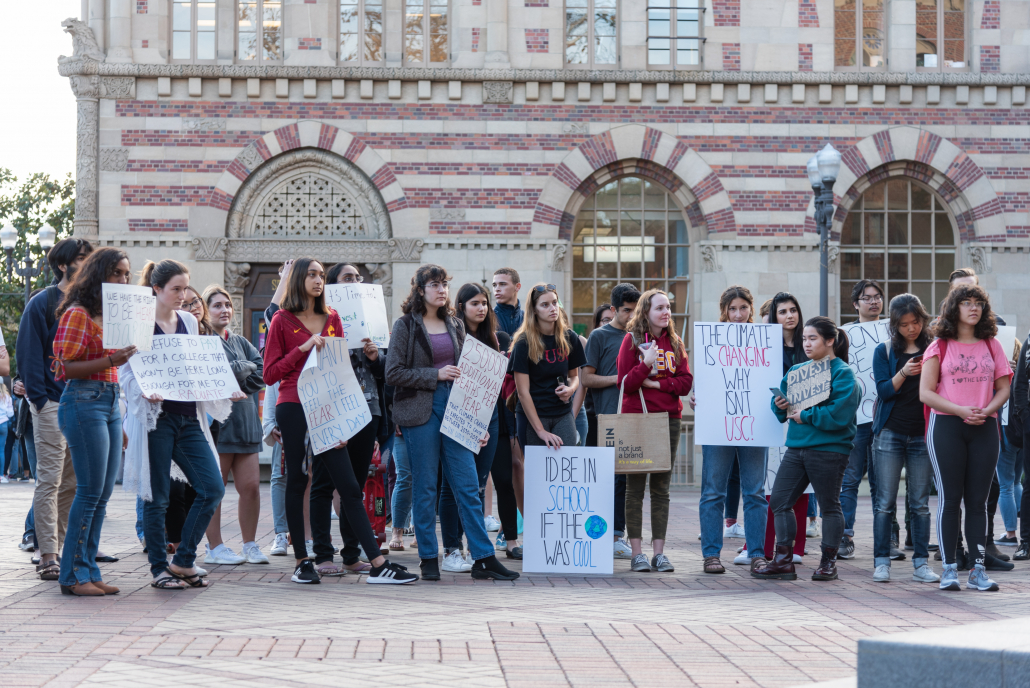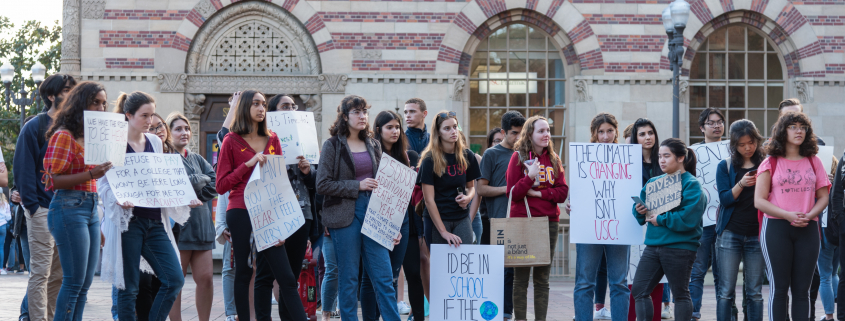Students relaunch fossil fuel divestment campaign

DivestSC, a student-led campaign that pressured USC to disclose its $277 million investment in the fossil fuel industry last January, relaunched Monday in a letter urging the Board of Trustees’ Investment Committee to publicly divest from the fossil fuel industry and reinvest in renewable energy.
The Environmental Student Assembly and USC Environmental Core, led by then student organization representatives Nathaniel Hyman and Tianna Shaw-Wakeman, wrote a letter to President Carol Folt in December, calling on the University to disclose its endowment investments in the fossil fuel industry. At the time, DivestSC was an alliance between students from various organizations, supported by the Undergraduate Student Government and Graduate Student Government. Now, DivestSC operates as a distinct committee, led by co-chairs Hyman and Shaw-Wakeman.
Having achieved transparency about the endowment through their first letter, rallies and calls to the Investment Office, the committee looks to continue to urge the University to divest and reinvest.
In an interview with the Daily Trojan, Hyman said the campaign was put on pause due to the coronavirus, as pressuring the University to divest during the market crash would have damaged the endowment. However, now that the markets have stabilized, he said that it is time for the campaign to relaunch and for the University to be proactive in addressing the climate emergency.
“We do have to have a certain level of urgency because, obviously, the time to do this was 10 years ago,” Hyman said. “It’s just important to avoid any sense of complacency and to recognize that … this is the bare minimum of responsibility.”
The present moment is also one colored by the pandemic and a nationwide reckoning with systemic racism, DivestSC wrote. The letter also stated that USC’s public statements on fighting racial injustice and combating the coronavirus are connected to climate responsibility, fitting divestment into ongoing University efforts.
“It’s not just that sustainability and racial justice and the finances of our endowment live in silos, but that they’re all related,” Shaw-Wakeman said in an interview with the Daily Trojan. “When we push one forward we can push the others forward.”
Shaw-Wakeman and Hyman said, unlike divestment movements at other schools such as Harvard and Yale universities, DivestSC also includes more of a financial argument. The letter states that divesting from fossil fuels is financially responsible and would protect the endowment, citing how the market crash from to the coronavirus pandemic caused the University’s endowment to sink along with fossil fuel prices.
“We’re more based in the financial argument, wherein it’s not just climate change, although that should be a sufficient reason, but there’s also a very strong financial argument to say, these other issues aside, it is part of your fiduciary responsibility to divest from fossil fuels because it is good for your endowments,” Hyman said. “So that’s been a very big focus of our effort and it’s why we’ve done a lot of work to try to make sure our financial research operation is pretty strong.”
The letter also stated that if USC divests from fossil fuel, other institutions will follow and would thus “free hundreds of billions of dollars for investment in alternative sources of energy.” According to the letter, the large-scale change that USC could lead would contribute to the fight against racism, future pandemics and the climate emergency.
“If USC is the only institution that does this, that’s not extraordinarily meaningful,” Hyman said. “There needs to be a public indication so that there’s a compounding effect on this with other endowments. One thing that we’re trying to do is also put out research, put out resources, so that other students, other schools, can have similar efforts … For this to be meaningful, it needs to be picked up by a lot of people.”
Before DivestSC paused their efforts, Folt and the Board of Trustees’ Investment Committee invited the group for initial talks on divestment and reinvestment. This was the first time students were invited to discuss the endowment with these stakeholders, according to DivestSC.
“Because of the way that we went about the meetings … coming in very humbly and saying, ‘You are all financial professionals. We are not. We recognize that,’ that went a long way in just opening the lines of communication not just between DivestSC and the Investment Committee, but between students and the investment committee,” Shaw-Wakeman said. “It does work when students have a say in the things that happen, it does work when students get to have meetings with individuals on the Board of Trustees and maybe that’s something that can continue on in the future.”
Hyman said that they are optimistic that they will be able to have another meeting with the Board in the near future.
USC did not respond to the Daily Trojan’s request for comment in time for publication.

